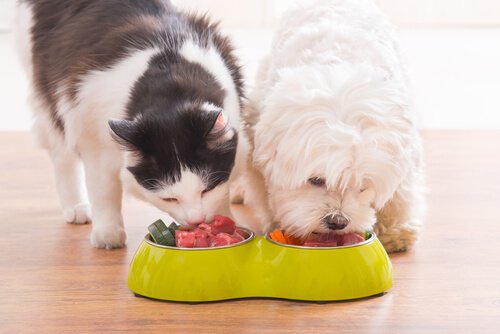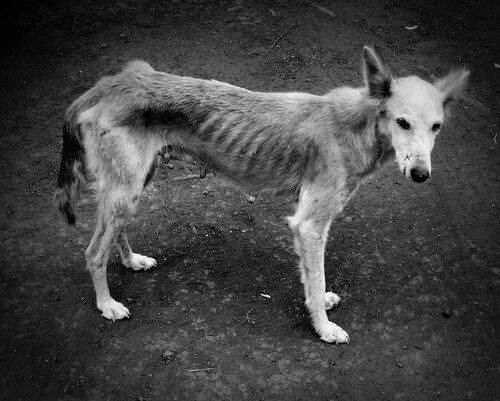Diseases Your Pet Could Get From a Poor Diet

Food that doesn’t provide necessary nutrients as well as too much or too little food can cause several different diseases in pets.
Food is a key component of our pets’ health. All species need to have a complete and well-balanced diet so that their body produces energy and has a stable metabolism. Below, you can learn about some tips for providing a high-quality diet to your pet and preventing diseases that are caused by a poor diet.
The importance of a good diet for your pet
As far as nutrients are concerned, when you eat healthy, your body responds better. Your mood is more pleasant, you have more energy and motivation to start each day, and you feel strong and resistant. Plus, a well-balanced diet enables you to manage a healthy weight and prevents several obesity related diseases.
Pets also benefit enormously from a balanced diet, according to their nutritional needs. There are more and more owners who choose to give a natural, homemade diet to their pets.
Many people continue using dry food as the foundation of their pets’ diet. This traditional option has the advantage of providing the proper amount of essential nutrients to pets at every stage of their lives. It is important to choose a good, easily digestible dog food with high-quality proteins
The BARF diet (Biologically Appropriate Raw Food) fulfills the nutritional needs of pets and prioritizes natural, organic foods. Its benefits include making digestion and dental hygiene easier, and strengthening their immune system.

However, remember that each animal has a different body with specific nutritional needs. Therefore, it is recommended to seek advice from a veterinarian in regards to planning a balanced diet for your pet.
The professional will help prepare an optimal diet according to the pet’s weight, age, size, breed, and other conditions. Therefore, a standardized diet is not possible.
Problems of malnutrition
A poor diet can be directly or indirectly be related with the development of several diseases. It is important to understand that a “poor diet” is not always associated with skinniness or malnutrition. An animal can be obese and still show signs of a diet deficiency.
A healthy diet must have the proper amount of essential nutrients for each animal’s body. Too many or not enough nutrients are harmful to their metabolism. Therefore, a balanced-diet is the key factor for being healthy.
Malnutrition is a disease pattern that needs a specific treatment with specialized supervision. In such cases, the veterinarian will recommend a high-calorie diet with high-quality proteins and healthy fats.

The main diseases a pet could get from a poor diet
Allergies
Allergies are the outcome of a hypersensitive reaction from the immune system. Different animal and vegetable protein sources could be allergenic agents for pets. Soy, corn, wheat, chicken, fish, dairy, and eggs are foods that often cause food intolerance and allergies in animals.
Diarrhea and vomiting
Even if they aren’t diseases, diarrhea and vomiting are the most common symptoms that indicate an animal is sick. There are multiple causes: from overeating or a sudden change in diet to food poisoning or allergies.
Gastritis
Gastritis diagnoses are becoming more common in domestic animals. The main causes include food intolerance, intestinal parasites, and reactions from bacterial antigens. Some animals might also develop gastritis due to having bad eating habits, like going too long without eating.
Inflammation of the esophagus
Fortunately, inflammation of the esophagus is not as frequent as other diseases that pets could get from a poor diet. It is a complex disease pattern that requires careful treatment for a full recovery.
In domestic animals, the inflammation of the esophagus is usually related to the consumption of meat and cooked bones. The bodies of carnivorous or omnivorous animals (like cats and dogs) are designed to digest meat and bones.
If you don’t want to give raw meat to your pets, you can cook it quickly over the stove. Cooked bones can splinter and cause damage in the animal’s digestive tract.
This text is provided for informational purposes only and does not replace consultation with a professional. If in doubt, consult your specialist.